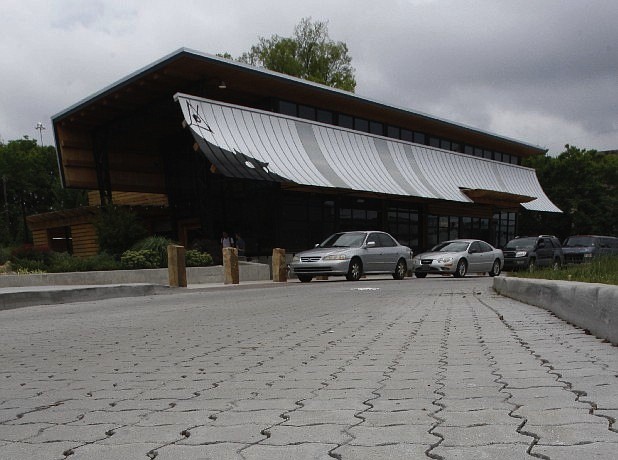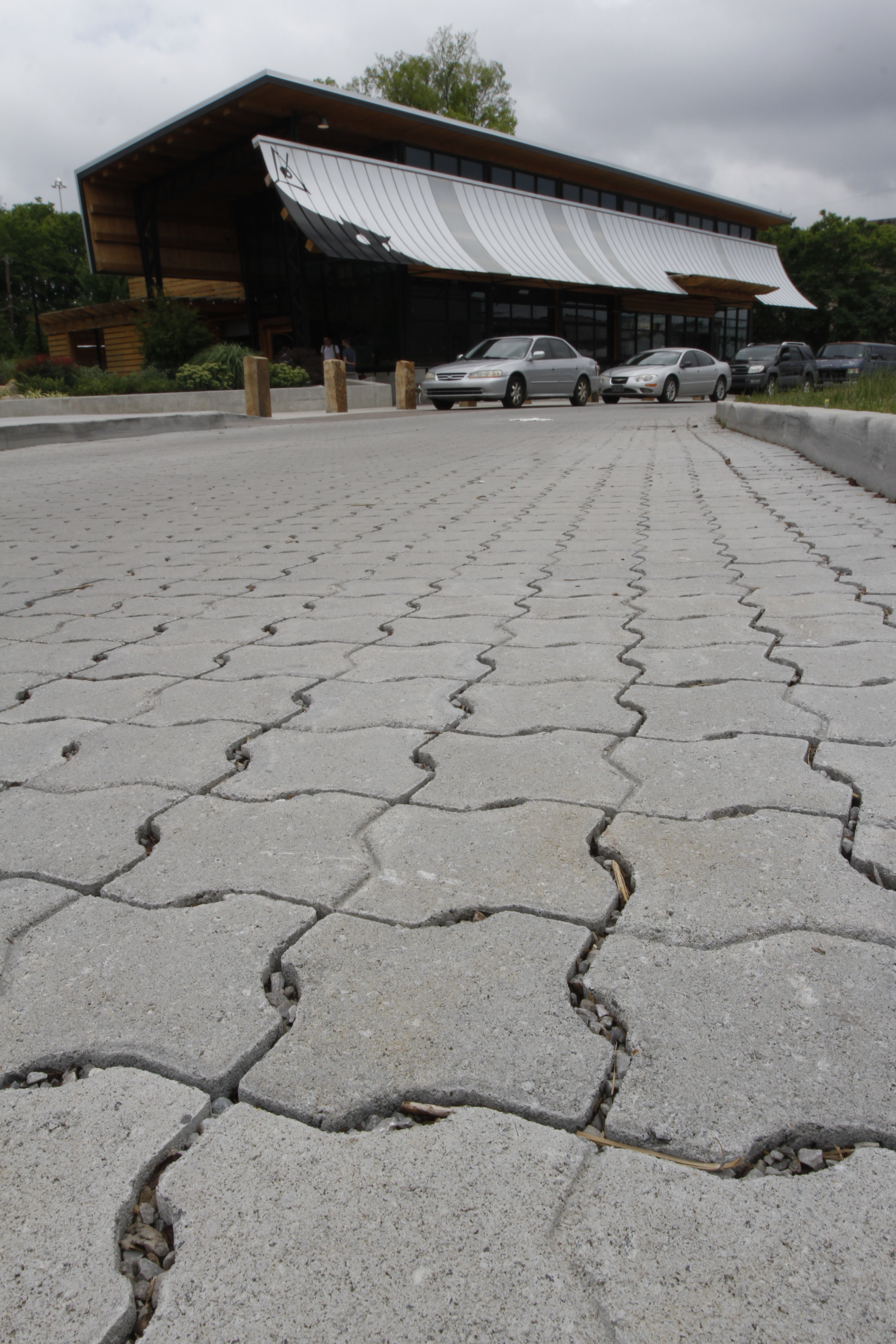Low-impact design challenge:* What: Green design competition sponsored by the city, Regional Planning Agency, green'spaces, Lyndhurst, River City Co. and Hamilton County Water Quality Program* Prize: $10,000 for first place, $3,000 for second place, $1,000 for third place, with People's Choice award of $2,000.* Why: Accelerate the adoption of green infrastructure practices for managing stormwater and complying with the new standards that take effect Dec. 1.* When: June 20 is the date by which entries must be submitted. Finalists announced June 27, with the awards program held on July 10.For more information, goto www.chattanooga.gov/public-works/city-engineering-a-water-quality-programSource: Chattanooga.gov
Saving the rain* Goal: Stop rain before it has a chance to overflow into the city's combined sewer system, dumping filth into the Tennessee River* Why: An EPA-mandated consent decree that requires the city to spend $250 million to repair its aging sewer infrastructure. And new state rules set to start on Dec. 1 will require all new construction in the city to prevent the first inch of rain runoff from entering the sewer.* How: A combination of sewer improvements, green roofs, and innovative methods of catching rand detaining rain before it enters the combined sewer system* Rain-stoppers: Permeable pavers, asphalt and concrete, set over three or more feet of gravel, filter rainwater and prevent it from immediately entering the city's combined sewer system.* Examples: The owners of the Crash Pad, as they were constructing adjacent bar The Flying Squirrel, opted to partner with the city to transform Johnson Street from a flooded mess into a rain catching money-saver.Source: City of Chattanooga, Flying Squirrel
When it rains, it pours raw sewage into the Tennessee River.
Chalk it up to stinky thinking. Decades ago, Chattanooga's city fathers chose to create a system that combines the city's sewer system with its storm drains, mingling rain runoff in a common stream with hundreds of millions of gallons of raw, untreated filth.
Common in many older towns, the simple system does its job, right up until the Scenic City receives a torrential downpour.
Slowly, the deluge inundates the city's ancient sewers, straining the capacity of the Moccasin Bend Wastewater Treatment Plant. One flush leads to another, and before long the contaminated sludge begins to overflow into the Tennessee River, a source of drinking water for communities across the Southeast.
That's why sewer bills will rise by 10 percent this year, adding about $3.11 the the average monthly bill of each residence so the city can build a cash hoard of more than $250 million to refurbish the city's sewer and stormwater infrastructure, as mandated by the Environmental Protection Agency.
The repairs will take many forms, from fixing leaks and overflows at the Moccasin Bend Wastewater Treatment Plant to adding rain gardens and green roofs to downtown high-rises.
The real trick is catching the rain before it follows gravity off of impermeable parking lots, roads and roofs and into Chattanooga's antiquated sewer system. If officials can figure out how to stop or at least slow the rain runoff, they stand a good chance of cutting out the use of the Tennessee River as Chattanooga's toilet.
Even now, the city is working to finalize a set of rules that will take effect Dec. 1, which are designed to gently push property owners to make improvements to the hard surfaces that repel the rain, unlike the grass and dirt found in nature.
"Any development or redevelopment will have to capture the first inch of rain of runoff on their property, and somehow soak it into the ground or reuse it and not let it run off," said Mark Heinzer, site development manager for Chattanooga's Land Development Office. "Right now, they can clean it up and let it run off the site."
Building owners will also have to offset any sanitary sewage that will run out of a building, he said, and can get a reduction in their stormwater fee if they figure out a way to do it, or if they partner with the city on a project.
"No one likes new regulations," Heinzer acknowledged. "The state tells us what to do but not how to do it. But we also do not kill development here in town, so we're trying to incentivify this stuff but still comply with the rules."
The goal is to encourage the addition of grassy areas, absorbent concrete and porous pavers, which capture and contain rainwater before it runs off into the sewer system, taking the load off the city's strained resources.
As part of the plan, Chattanooga will become one of the first cities in the U.S. to set up a stormwater market for property owners who replace their asphalt parking lots with porous concrete or pavers, allowing them to trade stormwater credits to those who can't make the same improvements.
Those who exceed the one-inch capture requirements for new construction will be able to sell the excess to those without the means to do so.
So far, few property owners have made such improvements to their sites, since it's easier and cheaper to pay the stormwater fee than it is to spend $100,000 on a new parking lot, Heinzer said.
"No one is doing it because they'll have to spend $30,000 to get $1,000 off their yearly fee, so it takes 30 years to get their money back and they'll have to repave it by that time anyway," he said.
Still, the city is going above and beyond to work with property owners, as officials explore new ways to abide by Chattanooga's consent decree with the EPA, without making it prohibitively expensive to develop land in the area covered by the city's combined sewer system.
To soften the blow of the new rules, the city will allow current landowners to be grandfathered in under the old rules. Officials will also give a one-tenth inch rain credit for those who build new bus stops, redevelop old lots, build in a brownfield, create high-density developments, or build a high-rise.
"You could potentially find a project that meets all those qualifications where you only need to do half an inch," Heinzer said.
Merely building massive underground storage tanks is expensive, and those tanks don't grow along with the city. But working with property owners to make improvements to individual properties stops the problem before it starts, and only costs the city the lost fees that it refunds to participants, he said.
Just ask the owners of the Flying Squirrel bar, an upscale restaurant on Chattanooga's Southside just off Main Street. Technically, the wood and glass bar is located on Johnson Street, which for years has flooded quickly at the first sight of rain.
So when they decided to build their new restaurant in late 2012, stormwater was on their mind. A call to the city to complain about the puddles of water on Johnson Street quickly turned into a solution that could pave the way for future development.
Instead of spending hundreds of thousands of dollars on pipes, storage tanks and other types of abatement, Flying Squirrel owners Dan Rose and Max Poppel proposed a public-private partnership. They would front the cost for 14,000 square feet of permeable pavers to completely resurface Johnson Street if the city would agree to put them in, along with three feet of gravel to capture excess rainwater.
"The original proposal was to do just the intersection. We got them to consider doing the whole block," said Poppel. "The amount we spent on those roughly corresponded to whe amount of street improvements we were going to have to do anyway."
The total cost for the project was close to $350,000, costing city taxpayers only slightly more than re-paving the road traditionally. For Poppel and Rose, they gained the advantage of abating their rainwater runoff on the city street, rather than installing special tanks and pipes on their own property.
"It turned out that we were absorbing more water than we needed, and there's a small credit for future development as well," Rose said.
The pair in 2014 won the Tennessee Governor's Environmental Stewardship Award for excellence in green building, for both their work on the Flying Squirrel as well as the adjacent hostel, The Crash Pad, which was certified LEED Platinum in 2012 and was built on a brownfield.
Perhaps using porous pavers instead of impermeable asphalt could be a good fit for other redevelopments underway, Rose said, especially if they are capable of capturing more rain runoff than an undeveloped site would be.
"I see things like Patten Parkway and the Ross Hotel where we're tearing it up anyway, surely somebody over there is like let's do it like over at Johnson Street," Rose said. "You might as well do it with something that's not going to give you flooding all over the place."
One shortfall of the pavers is that though they add visual flair to a development, they aren't meant to handle high-traffic areas downtown like Market Street and Broad Street. Heavy trucks can throw up rocks that will break windows and damage nearby cars.
Luckily, pavers aren't the only material that can filter and store rainwater, Heinzer said. Officials are also experimenting with different types of porous concrete for high-traffic areas, but it's a difficult material to get just right.
"It's very sensitive to the mix design and the construction, you can't overwork it," Heinzer said. "There's a lot of science in that little brick there and a lot of chemistry in how to do that, then you need durability."
The city will build a demonstration project for property owners interested in working to abate their stormwater problem, using a stretch of street in Highland Park to show off all the new techniques for absorbing rain.
It won't just have pervious pavements, but will also feature lowered vegetation beds and other practices - part of the EPA's $250 million mandate and penalty, which required the city to show property owners what's expected over the next 16 years as part of a $476,000 penalty.
Contact staff writer Ellis Smith at 423-757-6315 or esmith@timesfreepress.com with tips and documents.

